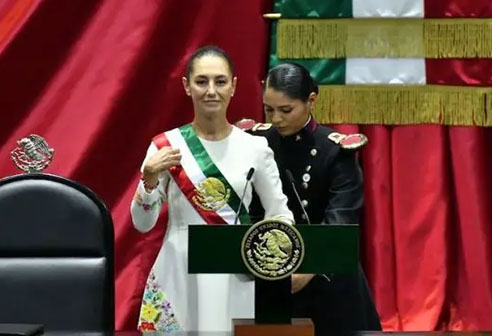by Mexico News Daily
Claudia Sheinbaum Pardo was sworn in as president of Mexico on Tuesday morning, becoming the first woman to lead Latin America’s second most populous country.
Sheinbaum, who won the June 2 presidential election on a ticket backed by the ruling Morena party and its allies, was proclaimed presidenta during a ceremony at the Legislative Palace of San Lázaro in Mexico City. Her six-year term will run until Sept. 30, 2030.
Sheinbaum took the oath of office in front of Mexican deputies and senators, world leaders and other foreign and Mexican dignitaries who attended the General Congress session.
The 62-year-old environmental scientist succeeds Andrés Manuel López Obrador, who led Mexico for the past five years and 10 months. AMLO, as the president is best known, was also in attendance at the swearing-in ceremony, wearing the presidential sash for the final time.
The sash was passed on to Sheinbaum, who put it on over the white dress she wore to the inauguration ceremony. In her first address as president, she promised to “govern for everyone” and said she did not arrive to power alone, but with all women.
Sheinbaum, Mexico City mayor between 2018 and 2023, has pledged to build the “second story” of the so-called “fourth transformation” of Mexico initiated by López Obrador and the Morena party, which AMLO founded.
She takes office at a time when the Mexican economy is slowing and insecurity plagues various parts of the country, including the northern state of Sinaloa, where Sinaloa Cartel infighting has resulted in scores of deaths in recent weeks.
Beyond the economy and insecurity, Sheinbaum will face a range of other challenges, including in the areas of energy, water and health care.
She will also face pressure from international investors, and possibly foreign governments, to uphold the rule of law, especially after judicial elections are held for the first time next year. Critics of the government’s recently enacted judicial reform claim that the elections could result in courts — including the Supreme Court — being stacked with judges sympathetic to the federal government’s legislative agenda.
That agenda includes a number of constitutional reform proposals López Obrador sent to Congress in February, as well as ones to be put forth by the new president.
As president, Sheinbaum will have immense power as a coalition led by Morena has a supermajority in the lower house of Congress and a near-supermajority in the Senate.
Morena’s legislative dominance was on display in September when the Congress approved the judicial reform and a constitutional bill that placed the National Guard under military control.
Sheinbaum joins a significant number of incumbent female world leaders, including President Xiomara Castro of Honduras, President Dina Boluarte of Peru and Prime Minister Mette Frederiksen of Denmark.
United States Democratic Party presidential nominee Kamala Harris could soon join the group, although the Nov. 5 election in the U.S. appears likely to be a very close contest between Harris and former president Donald Trump.
Among the female Latin American leaders who preceded Sheinbaum are president Dilma Roussef of Brazil, president Cristina Fernández de Kirchner of Argentina and president Michelle Bachelet of Chile.



